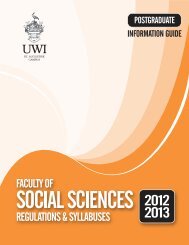Faculty of Humanities and Education (Postgraduate) - The University ...
Faculty of Humanities and Education (Postgraduate) - The University ...
Faculty of Humanities and Education (Postgraduate) - The University ...
Create successful ePaper yourself
Turn your PDF publications into a flip-book with our unique Google optimized e-Paper software.
POSTGRADUATE REGULATIONS & SYLLABUSES 2012 - 2013<br />
THE FACULTY OF HUMANITIES & EDUCATION<br />
Websites<br />
International Reading Association (www.reading.org)<br />
Middle Web (http://www.middleweb.com)<br />
NRP Report, 2000 (http://www.nichd.nih.gov/publications/nrp/<br />
upload/smallbook_pdf.pdf)<br />
NELP Report on Early Reading, 2008 (http://www.nifl.gov/nifl/<br />
NELP/NELPreport.html)<br />
Adolescent Literacy Research (http://www.learningpt.org/pdfs/<br />
literacy/tenYears.pdf)<br />
John Nemes’Website<br />
YEAR:<br />
SEMESTER:<br />
COURSE CODE: EDRL6001<br />
COURSE TITLE: THEORETICAL FOUNDATIONS OF READING<br />
INSTRUCTION<br />
NUMBER OF CREDITS: 4<br />
COURSE DESCRIPTION: This course, <strong>The</strong>oretical Foundations<br />
<strong>of</strong> Reading Instruction, is essentially about the psychological,<br />
sociological <strong>and</strong> linguistic foundations <strong>of</strong> reading <strong>and</strong> writing<br />
acquisition processes <strong>and</strong> how these link with instructional<br />
models, theories, <strong>and</strong> best practices. It is also about varied<br />
critical instructional approaches <strong>and</strong> materials, as well as<br />
ways <strong>of</strong> creating in-school <strong>and</strong> out-<strong>of</strong>-school environments<br />
in which struggling readers can thrive. It presents CONTENT<br />
through a melding <strong>of</strong> interactive lectures, vignette-driven<br />
tutorials, pr<strong>of</strong>essional dialogue, h<strong>and</strong>s-on workshop activities,<br />
<strong>and</strong> independent scrutiny <strong>of</strong> seminal research. Its purpose is<br />
to equip participants with the foundational knowledge <strong>and</strong><br />
insights necessary to make informed instructional choices <strong>and</strong><br />
to create environments in which struggling adolescent readers<br />
can grow in their love <strong>and</strong> appreciation <strong>of</strong> reading as a life skill<br />
<strong>and</strong> worthwhile pastime.<br />
<strong>The</strong> course addresses St<strong>and</strong>ards 1, 2 <strong>and</strong> 4 <strong>of</strong> the International<br />
Reading Association (IRA) St<strong>and</strong>ards for Reading Pr<strong>of</strong>essionals<br />
(2003).<br />
Content<br />
Content is comprised <strong>of</strong> Lectures <strong>and</strong> <strong>The</strong>ory-to-practice<br />
workshops.<br />
Lectures<br />
<strong>The</strong> following topics will be addressed:<br />
• Dimensions <strong>of</strong> the reading concept<br />
• Language models <strong>and</strong> reading acquisition processes<br />
• Lexical development <strong>and</strong> stage models<br />
• Models <strong>of</strong> the Reading <strong>and</strong> Writing Processes<br />
• Reading instruction models <strong>and</strong> models <strong>of</strong> writing<br />
instruction.<br />
<strong>The</strong>ory-to-practice workshops<br />
<strong>The</strong> following topics will be addressed:<br />
• Building knowledge <strong>of</strong> St<strong>and</strong>ard English <strong>and</strong> Creole<br />
orthography<br />
• Vocabulary instruction<br />
• Comprehension instruction<br />
• Fluency<br />
• <strong>The</strong> reading-writing connection<br />
General Objectives<br />
In order to achieve the course goal, the participants will:<br />
• relate theories <strong>of</strong> language acquisition/learning to reading<br />
acquisition processes<br />
• explore the psychological, sociological, <strong>and</strong> linguistic roots<br />
<strong>of</strong> reading <strong>and</strong> writing development, <strong>and</strong> models that have<br />
attempted to capture these<br />
• develop a pr<strong>of</strong>ile <strong>of</strong> the competent reader<br />
• identify factors that contribute to individual differences in<br />
reading acquisition processes<br />
• explore influential studies on the teaching <strong>and</strong> learning <strong>of</strong><br />
reading <strong>and</strong> summarise their principles, approaches, <strong>and</strong><br />
strategies<br />
• develop concepts <strong>of</strong> learning environments that would<br />
improve the reading <strong>of</strong> struggling adolescents<br />
• select appropriate learning materials <strong>and</strong> instructional<br />
approaches <strong>and</strong> activities by reference to the literature on<br />
acquirers’/learners’ development/progression in language<br />
in general <strong>and</strong> reading in particular.<br />
Course Assessment<br />
Coursework will be worth 40% <strong>and</strong> will comprise<br />
1. A discussion forum (on aspects <strong>of</strong> reading<br />
instruction or the reading process) (10%)<br />
2. Two article reviews (10%)<br />
3. In-class assessment addressing the basic tenets<br />
<strong>of</strong> theories <strong>and</strong> models (20%)<br />
<strong>The</strong> final examination will be <strong>of</strong> 3 hours’ duration <strong>and</strong> be<br />
worth 60% <strong>of</strong> the total marks. <strong>The</strong> questions will address links<br />
between theory <strong>and</strong> best practice <strong>and</strong> the contributions to the<br />
development <strong>of</strong> best practices in particular areas <strong>of</strong> reading.<br />
Resources<br />
Books<br />
Calkins, L. M. (2000). <strong>The</strong> art <strong>of</strong> teaching reading. New York, NY:<br />
Allyn & Bacon.<br />
Gunning, T. G. (2001). Building Words: A resource manual for<br />
teaching word analysis <strong>and</strong> spelling strategies. Boston: Allyn<br />
& Bacon.<br />
McCormack, R.L., & Paratore, J.R. (2003). After early intervention,<br />
then what? Teaching struggling readers in grades 3 <strong>and</strong><br />
beyond. Newark, DE: International Reading Association.<br />
Nero, S.J. (2006). Dialects, Englishes <strong>and</strong> Creoles <strong>and</strong> education.<br />
Lawrence Erlbaum Associates, Inc.: Mahwah, NJ.<br />
Pearson, P. D.; Barr, R., Kamil, M. L. & Mosenthal, P. B. (Eds.).<br />
H<strong>and</strong>book <strong>of</strong> Reading Research. White Plains, NY: Longman.<br />
Pollard, V. (2007). From Jamaican Creole to St<strong>and</strong>ard English.<br />
<strong>University</strong> <strong>of</strong> the West Indies Press: Kingston, Jamaica.<br />
Rudell, R.B., & Unrau, N.J. (2004). <strong>The</strong>oretical model <strong>and</strong> processes<br />
<strong>of</strong> reading. (5 th Ed.). Newark, DE: International Reading<br />
Association.<br />
Tierney, R.J. & Readence, J.E. (Eds.). (2005). Reading strategies <strong>and</strong><br />
practices: A compendium (6 th Ed.). Boston: Allyn & Bacon.<br />
Tompkins, G.E. (2004). Literacy for the 21 st century: Teaching<br />
reading <strong>and</strong> writing in grades 4 to 8. Columbus, OH: Pearson/<br />
Merrill Prentice Hall.<br />
Tracy, D. H. & Morrow, L. M. (2006). Lenses on reading: An<br />
introduction to theories <strong>and</strong> models. New York, NY: Guilford<br />
Press. (Online)<br />
99

















